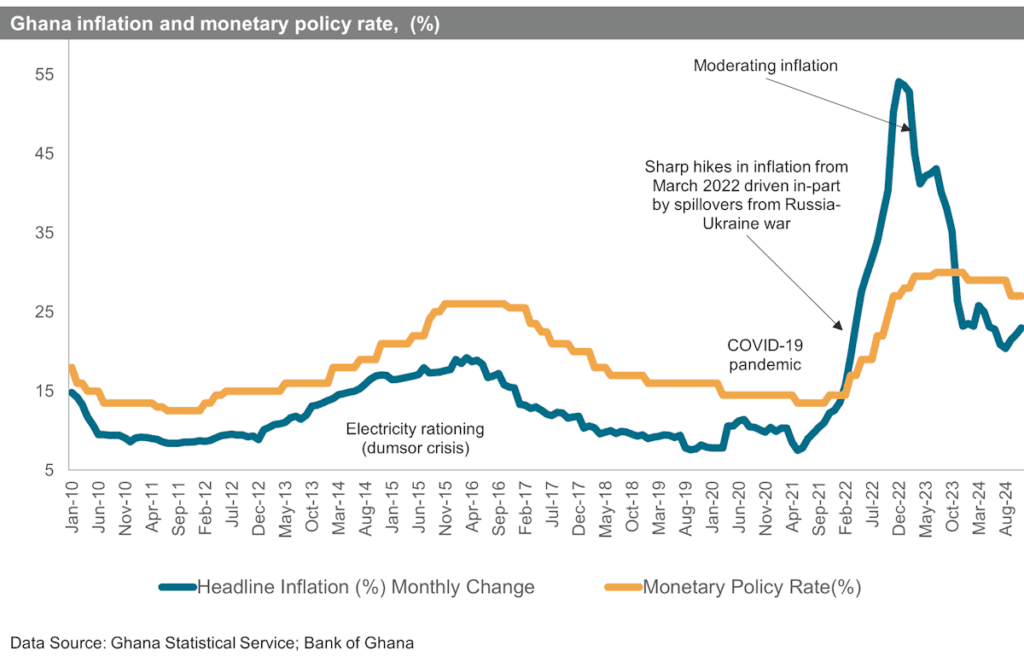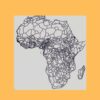The outcome and aftermath of Ghana’s 2024 elections will be a key test whether the West African nation can find a balance between the dual objectives of living within its means and achieving economic growth that creates sustainable jobs for its teeming youth.
Ghanaians are heading to the polls amid rising poverty and high cost of living. Ghana has been in economic crisis since 2022 when it was forced to seek assistance from the International Monetary Fund (IMF) to be able to meet its payments to the rest of the world and restore the health of government finances. This was the second time in the three years that Ghana had to tap the IMF, and 17th since independence in 1957.
Though inflation which peaked at 54% in 2022 and the country’s currency, the Cedi, have stabilised somewhat since mid-2023 under IMF-supported reforms, these improvements have not been significant enough to be felt by citizens. Inflation remains sticky. Monthly consumer inflation figures have averaged 22.85% from January to November 2024, below the pre-crisis (2017-2021) average of 10.14%.

Ghana Inflation and Monetary Policy Rate.
According to a recent report on voter concerns, the major issues are the economy, jobs, education, and roads and infrastructure provision. Others include addressing the illegal gold mining (‘galamsey’), health, agriculture, and corruption. The key concern on the economy is the declining living standards.
This is the context against which the 2024 elections are taking place. As an economist and risk analyst who researches Africa’s political economy, my reading is that the outcome and aftermath of the 2024 election will tell us a lot about voters’ views about the economy.
Among the key voting constituents will be the middle income earners who have been hit hard by the financial and economic crises. Historically, these voters tend to be the most analytical, voting or abstaining based on their analysis and feelings about issues.
Economic crisis and its impact
The economy is at the heart of the election and voter choices. This is because of the deterioration of the country’s economic fundamentals in the past few years. While the incumbent NPP administration has sought to blame the aftershocks of the Russian-Ukraine war and the pandemic for the severe economic and financial challenges, evidence available shows otherwise.
The major contributory factor was the poor management of its public finances, which meant the country did not have enough buffers to withstand these external shocks. Ghana’s economy and finances were already precarious before Putin invaded Ukraine in February 2022. Fiscal policy in Ghana is notably procyclical with “a clear bias towards overspending during good times”. This is related to commodity and electoral cycles. That is, fiscal deficits tend to increased sharply in election years, and has been even more so following commercial discovery of offshore oil in 2007.
The effects of the economic and financial crises since 2022 has been 20-year-high inflationary trends, local currency depreciation, dwindling foreign reserves, rising debt vulnerabilities, and increased poverty. At its height in December 2022, inflation reached 54%, the highest levels in nearly 20 years and public debt was 109% of GDP.
The economic challenges also forced Ghana to default on its external debt obligations in December 2022 and approach the IMF for a US$3 billion bailout, which was approved in May 2023. Ghana recently completed a three-step — domestic, bilateral, and commercial — debt restructuring process, which began in December 2022.
The domestic debt exchange programme (DDEP) was however largely unpopular. For example, pensioners at one point picketed for several weeks at the Ministry of Finance wanting their exclusion from the DDEP.
The data also shows that that poverty has been rising in Ghana since 2022. About 850,000 Ghanaians in 2022 were pushed into poverty due to rising costs of goods and services. Ghana’s poverty rate is forecast to rise to 30.6% of the population by 2026, indicating the extent the impact of the economic and financial crises on many citizens.
Many middle class citizens and households have been heavily impacted by the economic and financial crisis, including the domestic debt restructuring. Traditionally, these aspirational middle class voters, who live in urban and peri-urban areas like Accra, Kumasi, and Cape Coast, tend to be more analytical and vote or abstain based on issues.
Not all bad news
Nevertheless, Ghana’s economy has, since mid-2023, shown some improvements. Inflation has moderated somewhat. The currency, the Cedi, has stabilised against the US dollar, too. These gains have been off the back of IMF-supported reforms
The incumbent New Patriotic Party government is campaigning to be retained in power on the strength of these improvements. It has also pointed to investments in education such as its free senior high school policy as some of the positives.
The policy agendas of two main parties — the National Democratic Congress and the New Patriotic Party— are premised on getting the economy growing again.
However, their proposed spending plans, will, if implemented, likely lead to Ghana breaching its debt sustainability thresholds. This would threaten the implementation of the current IMF programme which runs until 2026.
The key concern remains whether Ghana will be able to live within its means going forward by reducing corruption and waste in government spending. This will avoid the procyclical boom-bust behaviour especially tied to the electoral cycle.
Conclusion
Ghana’s December 7 elections and its aftermath would be a key test of the extent to which the country is able to maintain the dual objectives of fiscal consolidation and inclusive economic growth that creates sustainable jobs for Ghana’s teeming youth.
Any new government who comes into power in January 2025 will have very little fiscal space to use to meet the several promises, including on infrastructure provision and the several tax breaks, announced in their pre-election manifestos.
This article was first published by the Conversation:

